Genre: RPG Developer: Koei Publisher: Koei Players: 1 Released: 1994
I must admit, it took me a long time to finally review this game. Before rating a title, I like to do a complete playthrough at least once to see whether a game is really worth it. With Uncharted Waters II: New Horizons I decided that I had to finish the game twice, to see whether the game would play differently the second time around. This wasn’t helped by the fact that this definitely isn’t of the “pick up and play” variety. If you want to play New Horizons, you have to take your time, lots and lots of time.
And boy is it ever worth it!
If you’ve read on until this point, then you just might be the kind of person to draw enjoyment from a title like this. You see, Uncharted Waters is a series of historic strategy-RPGs set in a specific era of Earth’s history, the Age of Discovery, when daring adventurers and enterprising privateers where circling the globe for the very first time, for war and profit. That’s right: Set in the 17th century, you’re actually traveling around the actual Earth itself. Cities are found at specific coordinates in-game which (more or less) actually correspond with their real-life positions on the world map.
On first glance, this game seems similar to Pirates! Gold: both games are set within roughly the same time period (Age of Discovery and early colonization; specifically, New Horizons takes place in the year 1552, while the earliest pirate era starts in 1560), center on naval exploration, making a career as a merchant, a hunter of pirates, or being a pirate yourself. Both games also share a trading system which is influenced by your actions – prices rise and drop depending on whether you go on a looting and plundering spree within a certain area or flood the market constantly with goods of a certain kind. You hire crew members by visiting the taverns in various harbors where you can also catch up on the latest gossip. And when you decide to attack (or are attacked by) another ship, the outcome of battle is decided by a fencing duel between you and the enemy captain. This is where the similarities pretty much end, however, because there’s more to this game… much more. And this isn’t just due to the fact that while Pirates! Gold limits your endeavors to the Caribbean, New Horizon’s action spreads out over the entire globe.
To start off, you choose one out of six characters, that all come with their own storyline. Joao Franco, son of the hero of the first game, is commanded by his father (now a Portuguese duke) to find the “Secret of Atlantis” – a cryptic task that kicks off a long journey full of discoveries and plot twists. Catalina Eranzo is a Spanish naval officer that goes rogue after her brother is killed. She is denied acting out her revenge from official side, so she goes rogue and becomes a pirate. A third is Ali Vezas who, for example, is a poor Turkish orphan who wants to make it big as a merchant and become the master of his own fate. All in all there are six characters to choose from, all of whose fates intertwine story-wise (to a point where the other selectable characters may temporarily or even permanently join your crew, but each on its own with individual goals and outcomes) and whose careers are centered on either discovery and exploration, trade, or fighting (for a specific nation or by piracy). Every story plays out differently, which greatly improves the replay value. Of course, you are not limited to the predefined career of choice; you can practically go rouge or defect and join another nation (the Spanish, Portuguese, English or Turkish), but the plot will be on halt as long as you don’t switch back to your original predetermined choice (unless of course the story demands it).
Another big difference is the character development system. Akin to a RPG, each character has certain stats (like agility, charisma, or luck). You can hire mates who can fulfill certain functions within your crew, like becoming a bookkeeper (HIGHLY recommended!), a cartographer or, as your fleet of ships increases, acting captain on another vessel. By waging battles or making new discoveries you and your crew gain EXP. As you level up your skill increases, so that you may become more skilled as a merchant or a better swordsman. You also can buy additional equipment like figurines that may protect your ship from hazards you might encounter in unknown areas (like even sea monsters!) or weapons and armor to give you an advantage in individual battles.
Then there’s economics. To get started, you have to at least start out on a few trade routes in order to make some money. In most cases your starting vessels aren’t fit for taking on enemy ships straight on. Most cities carry some special goods that can be sold at quite some profit elsewhere, like gold, silver, grapes of porcelain. Of course the most profitable trade routes cover a lot of distance and are thus more dangerous. If you trade the same items in the same cities, however, you’ll spoil the prices and lessen your income over time, so you’ll have to vary your wares every once in a while. What’s interesting is that you can invest in harbors so that their markets may develop. This has two aims: The city may produce new goods to trade or build better ships, while at the same time it gets economically dependent of your home country. This of course draws attention of your homeland’s enemies, so if your superiority in one part of the world gets too big, chances are that you might encounter more and bigger hostile fleets intending to wrest the control from you again.
Finally, there’s the battle system. Whenever ships (or entire fleets) engage each other, the map switches into battle view. Here you commandeer your vessel in turn-based fashion on a grid. Color coded frames show you the potential range of each ship. You can fire on enemy ships, considering of course you sail on a warship (merchant vessels can load up more cargo, but carry less guns and aren’t as maneuverable). Of course, sinking a ship will get you battle experience, but capturing one will net you its cargo hold. If you engage the enemy’s flagship with yours, you can take on its captain to a duel. In a turn-based sword fight you play high and low defense cards determining your actions: If you manage to attack high while your opponent defends low you might do lots of damage, but you might miss the high action cards in the later turns of the battle, so you have to invest a lot of strategic thinking into these battles. It takes quite some time to master these duels. If you win, the loot is yours, which can net you quite a pretty penny.
As I said, if you want to play this game, you’ve got to take your time. You won’t get a hang of the controls right from the start but rather have to ease into them and play a while before you get the right feel of the gameplay. Once you’ve done that, however, you are treated with a gigantic world full of possibilities. Even after you’ve played through all of the six different storylines, you may still opt to set out for discovery of the last hidden secrets or gaining control of the entire world – be it by conquest, or by making every city economically dependent on your country. The choice is yours.
So if you are willing to invest some time into learning the New Horizon’s mechanics, you’ll be treated to a varied and long-lasting experience. The soundtrack is nice and the graphics to their job pretty well. This game’s not for everyone and is not easily accessible, but as a RPG-strategy mix, it stands out as a title particularly well put together and is therefore highly recommendable, both for its story and for its wholesome gameplay experience.
SCORE: 8 out of 10

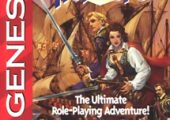
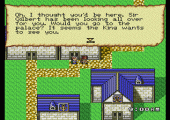
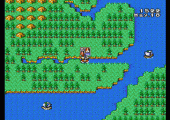
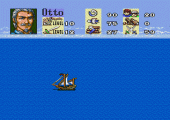
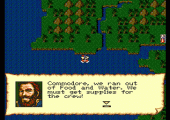
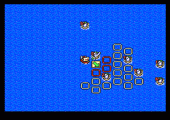
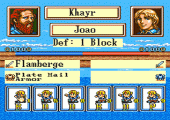
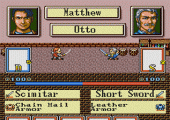
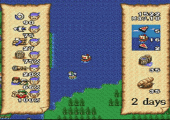
Recent Comments